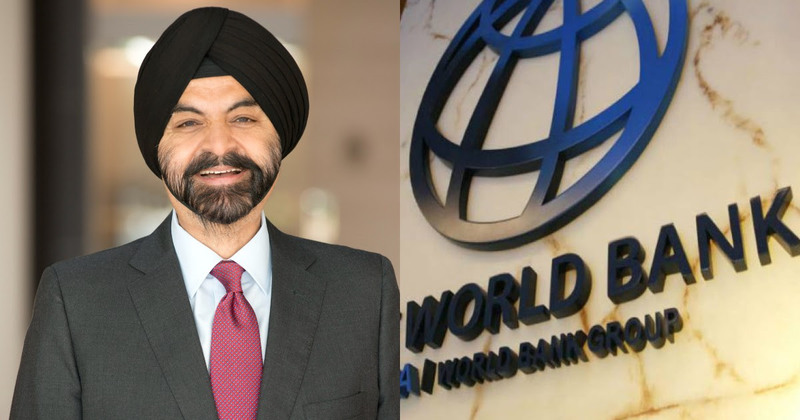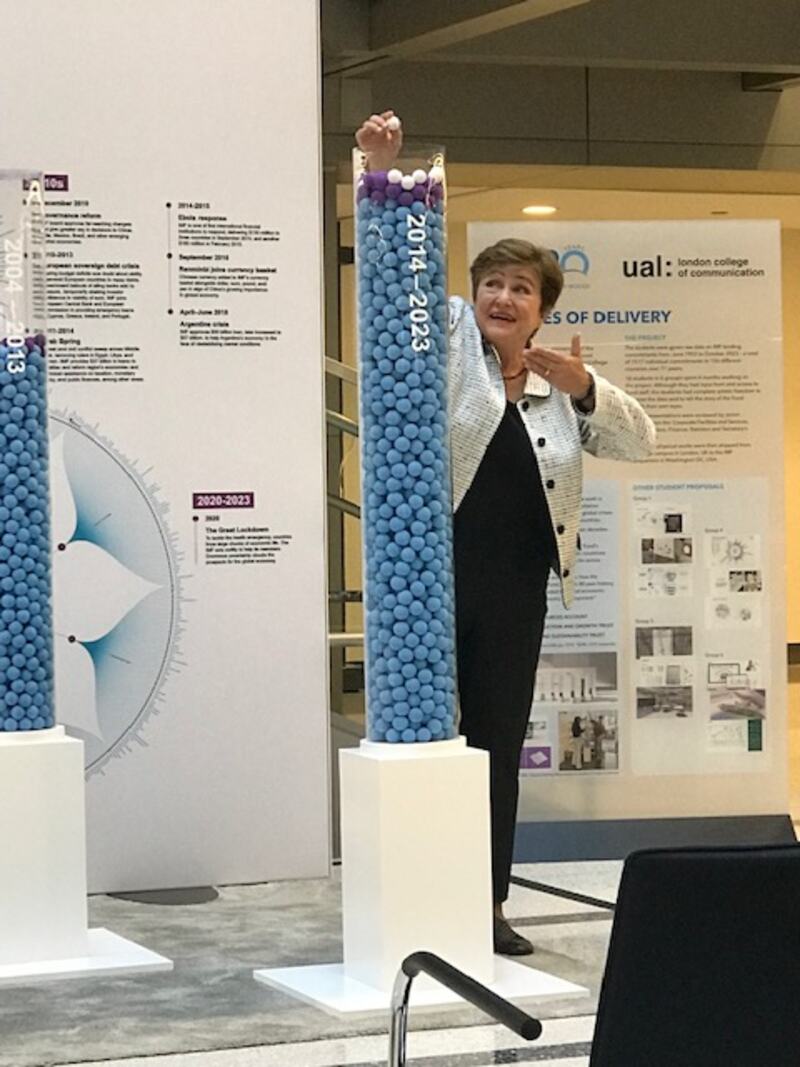Column: IMF, 80 Years, Trade & More
[Column written by Patrice Horner]
Rebuilding international cooperation and trade was a critical issue after the horrors of World War II. The importance has remerged as critical issue this year, with the wars in the Ukraine, Gaza, and after the U.S. Election. Trade creates cohesion around the globe. The International Monetary Fund [IMF] was established 80 years ago, along with the World Bank. The Articles of Agreement of the International Monetary Fund were adopted at the United Nations Monetary and Financial Conference [Bretton Woods, New Hampshire] on July 22, 1944. The IMF has three critical missions: furthering international monetary cooperation, encouraging the expansion of trade and economic growth, and discouraging policies that would harm prosperity.
It is 80th anniversary of the historic Bretton Woods agreement this year. The International Monetary Fund [IMF] and the World Bank [WB] combined to recognize the impact. Global Debt and Trade are now at the forefront. Thanks to the mechanisms put in place in 1944, the Global Economic growth is running above 3% after a handful of turbulent years “so hopefully we can breathe a sign of relief” said IMF Managing Director Kristalina Georgieva, “but there in no time to rest.”
John Lipsky, Vice-Chair Bretton Woods Committee with IMF Managing Director Kristalina Georgieva.
The fractured global trade is a negative factor for growth. In the last couple of years there have been passed 4,000 industrial policies breaking links of global trade, with 60% within the advanced economies. The 30% reduction global trade is contributing to the global economic slowdown. Inflation has slowed down with many Central Banks [CB] cutting interest rates in response. Yet prices have remained high, making people around the world angry. With high debt and low growth, it is challenging to invest in economies and especially in the Green Economy. “It is urgent to act or economies with suffocate”, which result in huge negative impacts globally.
Georgieva urged to “Act decisively on the fiscal front.” This Global Trade constriction is especially harming Emerging and Developing countries. Economies in the Emerging Markets [EM] are two-fold, either with strong or weak fundamentals. Even with strong fundamentals, some EM countries are more challenged to generate growth and prosperity, such as Argentina. It is a lack of surplus funds or liquidity versus a debt issue with weak fundamentals wherein the country cannot pay their debt.
Low-Income countries are in serious condition. Their debt levels are difficult to bear and require support to avoid dire debt sustainability problems, in countries like Chad and Ethiopia. The Global Sovereign Debt Roundtable [GSDR] with the World Bank [WB] has a restructure framework. The World Bank Group President is Ajay Banga. The GSDR brings together debtor countries and creditors to build greater common understanding on how to address debt sustainability and debt restructuring challenges.
World Bank President, Aja Banga.
It is important to inject liquidity in a synchronized basis and to systematically address solutions to fortify the global economy. This will open the door for wider funding of solutions. Originally 35 member countries in the IMF, there are now 191 members with the addition of Liechtenstein in November. The membership of the IMF has enabled it to transfer its financial strength and to provide critical financial buffers, such as during the covid crisis. Such transfers can reduce fees and redirect income to concessional financing, increasing it by nearly 3-times. The Financial Round-Table for Financial Institutions [FFI], and so called Non-Financial Institutions [NFI], along with debtor countries convene to identify the problems. The question is liquidity versus solvency. One can lead to another. Creditors need to participate in restructuring.
Resiliency and Sustainability Trust Fund [RST] is the first ‘long-term’ lending facility with 10-20 year terms of concessional funds to provide countries space for climate sustainability as well as pandemics. The countries that participated in the 2020 Special Drawing Right [SDR] can redirect the surplus Rights back to IMF to reallocate to the RST. The IMF mobilized $40 billion. The 2020 SDR was weighted to larger countries on a prorata basis. “Money should not be left idol” explained IMF Managing Director Georgieva. Funds from the RST can create the critical fiscal space for struggling countries where required.
Climate Risks are decimating the economy of some countries. Addressing this risk is the potential role of RST. Facilitating the climate transition will also assist in creating jobs and ‘capture the opportunities’ in building new industries. Climate impacts are being considered under IMF Article XIV, Restrictions on Payments and Transfers: Withdrawal Meaning of “In Exceptional Circumstances”, to include reduction of Green House Gases [GHG] and to incentify a transformation. How can vulnerable countries become more resilient without the capital to do so? A Financial Sector Assessment Program [FSAP] can be deployed to identify where banks are exposed to climate vulnerable properties. The FSAP has been utilized by Japan and Saudi Arabia amongst others. It can also address how to approach growth on a sustainable basis. And how to efficiently and effectively deploy capital via fiscal policy and high policy lending programmes.
IMF Managing Director Kristalina Georgieva with London College of Communications visual of the growth of IMF members at the 80th Anniversary.
In recognition of the 80th anniversary of the United Nations Monetary and Financial Conference [the “Bretton Woods Conference”], the International Monetary Fund and the World Bank Group announced the launch of a consultation in July 2024 to develop a long-term view on the future of the world economy, international cooperation, and the roles of the Bank and the Fund. As of Nov 1st, the new Chair of Bretton Woods will be from Sub-Sahara Africa [SSA].
The world is multi-polar. ASIAN and Gulf countries are very dynamic. Other parts of the world are less so. Solutions need to stay ahead of changes to deliver value, growth prospects, and a framework that suits the region, on how to address the global fractionalization. “It can’t stay still when the world is changing. It has to change with the world.” Harness a creative capability to protect the global financial system. “We are young and dynamic”, declared the IMF Managing Director Georgieva.
World Bank [WB] President Ajay Banga elaborated that the largest challenge facing world economies on the 80th Anniversary is reconstruction and redevelopment. Now it is tilting toward the later. Nature has evolved. We can no longer separate economy from climate and biodiversity. WB is replumbing the operations to support communities and to enable an environment for a virtuous cycle. Sum of the parts should be greater. Turnaround time must improve, ie to establish an Africa company in less than 100 days for example. There will be 300 million people in Africa by 2050. The region requires correspondent banks to address Environmental and Social Frameworks. WB looks to combine country offices and to expand bank capacity through Scope 115 infrastructure improvements. There is publicly available a new free digital software ‘Global Public Good’ to Manage Health and Social Protection Programs.
Visual History of 80 Years of IMF by the London College of Communications.
Private investment will be attracted to close the funding gaps. Capital adequacy requirements have been enhanced with hybrid capital and guarantees. A Sustainable Environment fund is aimed to reimburse for positive impacts. They are Contingent Instruments. There could be a ‘buy-down’ of interest rates after meeting a specified outcome. Commercial guarantees can have performance hurdles. Such financial instruments can protect the investments of shareholders. The Multilateral Investment Guarantee Agency [MIGA] was created in 1988 to promote foreign direct investment into developing countries and underwrite Political Risk. Forecasting foreign exchange rates is challenging but can factor in the level of Local Currency surplus.
Standardized loans will enhance the number of loans to build an asset class for bundling and packaging for scale and transparency. Multiple Development and Regional Development Banks can cofinance with WB, focusing on the Amazon, Climate, and Gender Education. They are tracked for progress regularly. WB has a digital platform listing projects on which the banks can bid. There are 100 projects in the system as of 2024. They are working toward shared due diligence packages for the Development Banks to expediate project funding. Funding is the lifeline for these countries.
WB President Banga concludes “this is the time for richer countries to get leverage on their money”… “make as much noise as you can”. It is not about the building blocks it is about creating jobs and mitigating climate disasters. “Forecasts are not destiny.” Action and funds can reduce weather-related migration and potential conflict. Having work for the 1.2 billion people will create a virtuous cycle and give rise with their enthusiasm. Jobs create the biggest dent in poverty and create monetary flows within the communities.
- Patrice Horner, MBA, EFA
Read More About
Category: All





